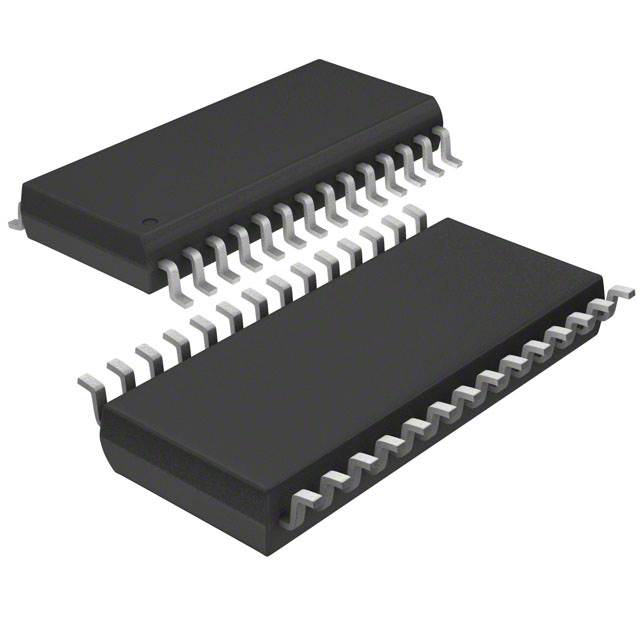Zie specificaties voor productdetails.

CY7C65213-28PVXI
Introduction
The CY7C65213-28PVXI is a versatile USB-UART bridge controller designed for various applications. This entry provides an overview of the product, including its category, use, characteristics, package, specifications, pin configuration, functional features, advantages and disadvantages, working principles, application field plans, and alternative models.
Basic Information Overview
- Category: Integrated Circuit (IC)
- Use: The CY7C65213-28PVXI serves as a USB-UART bridge controller, facilitating communication between USB and serial UART interfaces.
- Characteristics: It offers high flexibility, compatibility with various operating systems, and low power consumption.
- Package: The CY7C65213-28PVXI is available in a compact and durable package suitable for surface mount technology (SMT) applications.
- Essence: Its essence lies in providing seamless connectivity and data transfer between USB and UART interfaces.
- Packaging/Quantity: Typically supplied in reels or tubes, the quantity per package varies based on manufacturer specifications.
Specifications
The CY7C65213-28PVXI features the following specifications: - USB Version: 2.0 Full-Speed (12 Mbps) - UART Interface: Supports baud rates up to 3 Mbps - Operating Voltage: 3.3V - Operating Temperature Range: -40°C to 85°C - GPIO Pins: Configurable general-purpose I/O pins
Detailed Pin Configuration
The detailed pin configuration of the CY7C65213-28PVXI includes the assignment of pins for USB and UART communication, power supply, and GPIO functionality. Refer to the product datasheet for specific pinout details.
Functional Features
- USB-UART Bridge: Enables seamless data transfer between USB and UART interfaces.
- Flexible Baud Rate Support: Accommodates a wide range of baud rates for UART communication.
- GPIO Flexibility: Offers configurable general-purpose I/O pins for additional functionality.
- Operating System Compatibility: Supports various operating systems, including Windows, Linux, and macOS.
Advantages and Disadvantages
Advantages
- Versatile connectivity solution
- Low power consumption
- Compact form factor
- Wide operating temperature range
Disadvantages
- Limited support for higher baud rates compared to some alternative models
- Potential driver compatibility issues with certain operating systems
Working Principles
The CY7C65213-28PVXI operates by managing the flow of data between the USB and UART interfaces. It utilizes internal protocols and logic to ensure seamless communication and data integrity.
Detailed Application Field Plans
The CY7C65213-28PVXI finds application in various fields, including: - Embedded Systems: Integration into microcontroller-based embedded systems for USB connectivity - Industrial Automation: Facilitating communication between industrial equipment and control systems - Consumer Electronics: Enabling USB-to-UART communication in consumer electronic devices - Communication Devices: Supporting UART connectivity in communication devices such as modems and routers
Detailed and Complete Alternative Models
- FTDI FT232R: Offers similar USB-UART bridge functionality with robust driver support
- Silicon Labs CP2102: Provides a cost-effective USB-UART bridge solution with broad operating system compatibility
- Prolific PL2303HX: Known for its simplicity and ease of integration in various applications
In conclusion, the CY7C65213-28PVXI serves as a reliable USB-UART bridge controller with versatile applications across different industries. Its flexible connectivity options, low power consumption, and compact form factor make it a preferred choice for many design engineers.
Word Count: 496
Noem 10 veelgestelde vragen en antwoorden met betrekking tot de toepassing van CY7C65213-28PVXI in technische oplossingen
What is the CY7C65213-28PVXI used for?
- The CY7C65213-28PVXI is a USB-UART bridge controller that can be used to connect microcontrollers or other embedded systems to a computer via USB.
What are the key features of the CY7C65213-28PVXI?
- Some key features include USB 2.0 Full-Speed (12 Mbps) support, UART interface with baud rates up to 3 Mbps, and support for multiple GPIOs.
How can I interface the CY7C65213-28PVXI with a microcontroller?
- The CY7C65213-28PVXI can be interfaced with a microcontroller using its UART interface and GPIO pins.
Can the CY7C65213-28PVXI be used for USB to serial communication?
- Yes, the CY7C65213-28PVXI is commonly used for USB to serial communication applications.
What operating systems are supported by the CY7C65213-28PVXI?
- The CY7C65213-28PVXI supports various operating systems including Windows, Linux, and macOS.
Is the CY7C65213-28PVXI suitable for industrial applications?
- Yes, the CY7C65213-28PVXI is suitable for industrial applications due to its robust design and reliability.
Can the CY7C65213-28PVXI be used for developing USB-based data acquisition systems?
- Absolutely, the CY7C65213-28PVXI can be utilized in the development of USB-based data acquisition systems.
What programming languages can be used to interface with the CY7C65213-28PVXI?
- The CY7C65213-28PVXI can be interfaced with using languages such as C, C++, Python, and others depending on the host system.
Are there any application notes or reference designs available for the CY7C65213-28PVXI?
- Yes, Cypress Semiconductor provides application notes and reference designs to assist with the implementation of the CY7C65213-28PVXI in technical solutions.
What are some common troubleshooting steps for issues related to the CY7C65213-28PVXI?
- Common troubleshooting steps may include checking connections, verifying driver installation, and ensuring proper configuration of the device. Additionally, referring to the datasheet and application notes can provide valuable insights for issue resolution.

